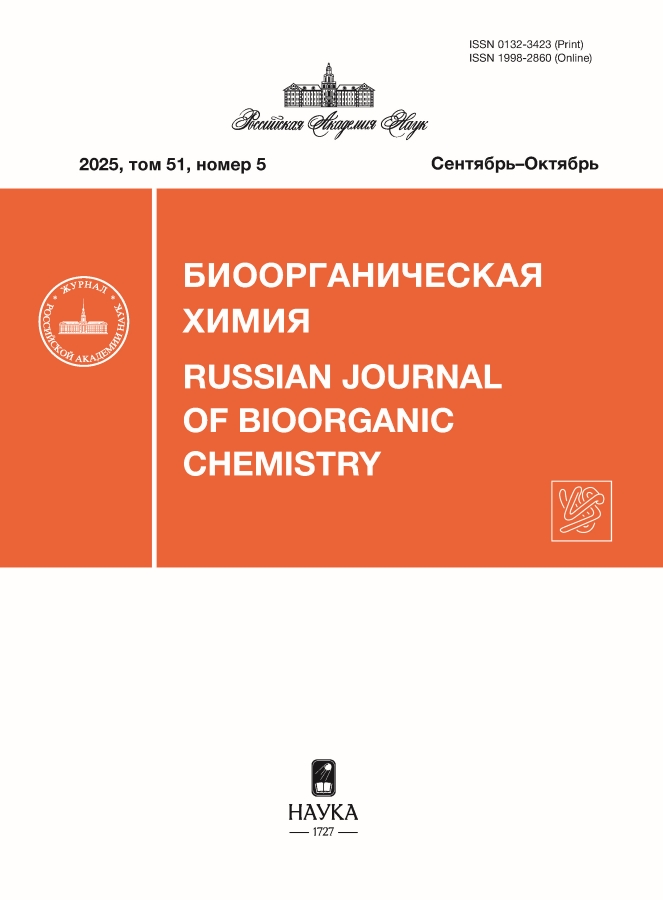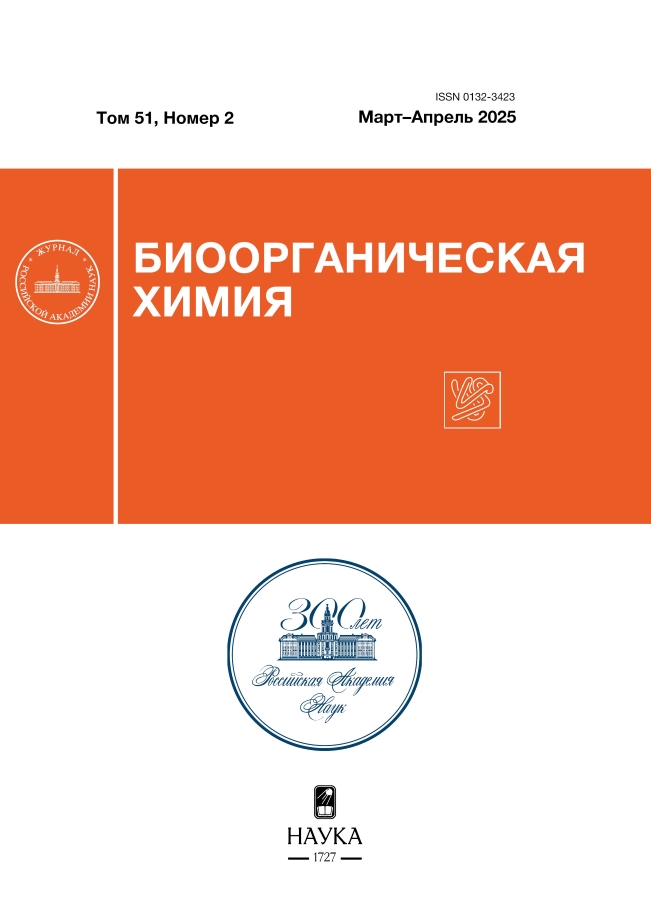Synthesis and Properties of Phosphoryl Guanidine Oligonucleotides Containing 2ʹ,4ʹ-Locked Nucleotides
- Authors: Dyudeeva E.S.1, Lyapin P.K.1, Dmitrienko E.V.1
-
Affiliations:
- Institute of Chemical Biology and Fundamental Medicine, Siberian Branch RAS
- Issue: Vol 51, No 2 (2025)
- Pages: 318-328
- Section: Articles
- URL: https://rjmseer.com/0132-3423/article/view/682744
- DOI: https://doi.org/10.31857/S0132342325020101
- EDN: https://elibrary.ru/LBSOGZ
- ID: 682744
Cite item
Abstract
This work presents a new version of synthetic analogues of oligonucleotides containing two types of modifications – phosphoryl guanidine (PG) internucleotide group and 2ʹ,4ʹ-locked ribose fragments (LNA) – in one nucleotide unit. It has been shown the presence of PG-LNA linkages decreases the electrophoretic mobility of the oligonucleotides, primarily due to the electroneutrality of the PG group. Additionally, the PG-LNA modifications increase the hydrophobicity of the oligonucleotides, resulting in longer retention times during reversed-phase chromatography. The thermal stability of complementary duplexes containing PG-LNA oligonucleotides has been investigated. It was found the melting temperature increases by 1.5–4.0°C per modification, depending on the position of the modified unit and the ionic strength of the solution. Furthermore, circular dichroism spectropolarimetry revealed the secondary structure of the complexes formed by PG-LNA differs from the B-form, which may be attributed to the presence of LNA fragments exhibiting a 3'-endo conformation of the ribose ring. Thus, PG-LNA oligonucleotides can be considered as a new structural analogue of RNA with partially uncharged backbone. Based on the data obtained, it can be concluded that PG-LNA oligonucleotides can be considered as a promising tool for various methods of isolation and analysis of nucleic acids.
Full Text
About the authors
E. S. Dyudeeva
Institute of Chemical Biology and Fundamental Medicine, Siberian Branch RAS
Author for correspondence.
Email: jenyadudeeva@gmail.com
Russian Federation, prosp. Akad. Lavrentieva 8, Novosibirsk, 630090
P. K. Lyapin
Institute of Chemical Biology and Fundamental Medicine, Siberian Branch RAS
Email: jenyadudeeva@gmail.com
Russian Federation, prosp. Akad. Lavrentieva 8, Novosibirsk, 630090
E. V. Dmitrienko
Institute of Chemical Biology and Fundamental Medicine, Siberian Branch RAS
Email: jenyadudeeva@gmail.com
Russian Federation, prosp. Akad. Lavrentieva 8, Novosibirsk, 630090
References
- Agrawal S., Iyer R.P. // Curr. Opin. Biotechnol. 1995. V. 6. P. 12–19. https://doi.org/10.1016/0958-1669(95)80003-4
- Clafré S.A., Rinaldi M., Gasparini P., Seripa D., Bisceglia L., Zelante L., Farace M.G., Fazio V.M. // Nucleic Acids Res. 1995. V. 23. P. 4134–4142. https://doi.org/10.1093/nar/23.20.4134
- Wang S.S., Xiong E., Bhadra S., Ellington A.D. // PLoS One. 2022. V. 17. P. 1–16. https://doi.org/10.1371/journal.pone.0268575
- Bailey J.K., Shen W., Liang X.H., Crooke S.T. // Nucleic Acids Res. 2017. V. 45. P. 10649–10671. https://doi.org/10.1093/nar/gkx709
- Metelev V.G., Oretskaya T.S. // Russ. J. Bioorg. Chem. 2021. V. 47. P. 179–183. https://doi.org/10.31857/S0132342321020172
- Titze-de-Almeida R., David C., Titze-de-Almeida S.S. // Pharm. Res. 2017. V. 34. P. 1339–1363. https://doi.org/10.1007/s11095-017-2134-2
- Setten R.L., Rossi J.J., Han S.P. // Nat. Rev. Drug Discov. 2019. V. 18. P. 421–446. https://doi.org/10.1038/s41573-019-0017-4
- Fratczak A., Kierzek R., Kierzek E. // Biochemistry. 2009. V. 48. P. 514–516. https://doi.org/10.1021/bi8021069
- Kupryushkin M.S., Pyshnyi D.V., Stetsenko D.A. // Acta Naturae. 2014. V. 6. P. 116–118. https://cyberleninka.ru/article/n/phosphoryl-guanidines-a-new-type-of-nucleic-acid-analogues
- Freier S.M., Altmann K.H. // Nucleic Acids Res. 1997. V. 25. P. 4429–4443. https://doi.org/10.1093/nar/25.22.4429
- Koshkin A.A., Singh S.K., Nielsen P., Rajwanshi V.K., Kumar R., Meldgaard M., Olsen C.E., Wengel J. // Tetrahedron. 1998. V. 54. P. 3607–3630. https://doi.org/10.1016/S0040-4020(98)00094-5
- Egli M., Minasov G., Teplova M., Kumar R., Wengel J. // Chem. Commun. 2001. V. 1. P. 651–652. https://doi.org/10.1039/B009447L
- Lomzov A.A., Kupryushkin M.S., Shernyukov A.V., Nekrasov M.D., Dovydenko I.S., Stetsenko D.A., Pyshnyi D.V. // Biochem. Biophys. Res. Commun. 2019. V. 513. P. 807–811. https://doi.org/10.1016/j.bbrc.2019.04.024
- Dyudeeva E.S., Kupryushkin M.S., Lomzov A.A., Pyshnaya I.A., Pyshnyi D.V. // Russ. J. Bioorg. Chem. 2019. V. 45. P. 709–718. https://doi.org/10.1134/S1068162019060153
- Golyshev V.M., Pyshnyi D.V., Lomzov A.A. // J. Phys. Chem. B. 2021. V. 125. P. 2841–2855. https://doi.org/10.1021/acs.jpcb.0c10214
- Kaur H., Arora A., Wengel J., Maiti S. // Biochemistry. 2006. V. 45. P. 7347–7355. https://doi.org/10.1021/bi060307w
- Hull C., Szewcyk C., St. John P.M. // Nucleosides Nucleotides Nucleic Acids. 2012. V. 31. P. 28–41. https://doi.org/10.1080/15257770.2011.639826
- Wengel J., Koshkin A., Singh S.K., Nielsen P., Meldgaard M., Rajwanshi V.K., Kumar R., Skouv J., Nielsen C.B., Jacobsen J.P., Jacobsen N., Olsen C.E. // Nucleosides Nucleotides. 1999. V. 18. P. 1365–1370. https://doi.org/10.1080/07328319908044718
- Kypr J., Kejnovská I., Renčiuk D., Vorlíčková M. // Nucleic Acids Res. 2009. V. 37. P. 1713–1725. https://doi.org/10.1093/nar/gkp026
- Marin V., Hansen H.F., Koch T., Armitage B.A. // J. Biomol. Struct. Dyn. 2004. V. 21. P. 841–850. https://doi.org/10.1080/07391102.2004.10506974
- Vivek K., Rajwanshi V.K., Håkansson A.E., Sørensen M.D., Pitsch S., Singh S.K., Kumar K., Nielsen P., Wengel J. // Angewandte Chemie. 2000. V. 112. P. 1722–1725. https://doi.org/10.1002/(SICI)1521-3757(2000 0502)112:9<1722::AID-ANGE1722>3.0.CO;2-Z
- Stetsenko D.A., Kupryushkin M.S., Pyshnyi D.V. // Int. Application WO2016028187A1, 2016.
- Pavlova A.S., Yakovleva K.I., Epanchitseva A.V., Kupryushkin M.S., Pyshnaya I.A., Pyshnyi D.V., Ryabchikova E.I., Dovydenko I.S. // Int. J. Mol. Sci. 2021. V. 22. P. 9784. https://doi.org/10.3390/ijms22189784
Supplementary files


















